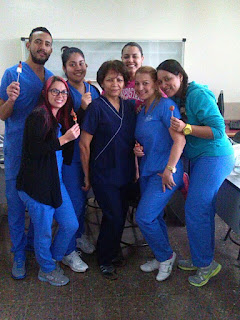Language learning experince
My experience was very bad with
the learning english, my base in this subject is fatal, I had never given the
importance to study a second language, now is different iI know that english is
important for everything, for to get a better job, for to socialize with other
people from other countries and other cultures. Now I can see the consequences
of not having a second lenguaje.
I want to learn a second
language, I have only my mother tongue and I want to speak English fluent and
have linguistic ability to learn other languages that would be incredible. I
think that some student´s spoken English is riddled with errors, for me is
important the fluency and the pronunciation. I feel very nevous about giving
presentations in English, I need more practice, exercises in english, I can see
programs of T.V in english but I don´t
know off the top of my head, what is most effective for learning English.
Mini Project 1
The teacher assigned articles about the importance of learning another language and we had to expose them to the class.
My article was about of bilingual acquisitions.
Language acquisition is an everyday and yet magical feat of childhood. Within three to five years, virtually all children become fully competent in at least one language.
1. Learning two languages in childhood is difficult and can result in delays in language development.
Children who have regular and rich exposure to both languages on a daily or weekly basis from parents and other caregivers exhibit the same milestones in language development and at roughly the same ages as monolingual children.
2. Bilingual children have less exposure to each of their languages than monolingual children. As a result, they never master either language fully and, compared to monolingual children, they never become as proficient.
Bilingual children can acquire the same proficiency in all aspects of their two languages over time as monolingual children even though they usually have less exposure to each language. Bilingual children acquire the same proficiency in the phonological and grammatical aspects of their two languages as monolingual children do in their one language, provided they are given regular and substantial exposure to each.
3. Young bilingual children can't keep their languages separate; they use both at the same time; they are obviously confused.
At some stage, most bilingual children use sounds and words from both languages in the same utterances or conversations even though the people talking with them are using only one language. Some parents and early childhood educators are concerned when they hear this because they believe that it means that the child is confused and cannot separate the two languages. Research shows that this is not true. The main reason for children mixing their languages in these ways is because they lack sufficient vocabulary in one or both languages to express themselves entirely in each language. Thus, they borrow from the other language. Indeed, this is an effective communication strategy in most families because parents and other adults who care for bilingual children usually understand both languages and may mix the languages themselves when talking with the child.
4. Using both languages in the same sentence or conversation is bad. Parents can discourage and even prevent their children from doing this by making sure that each of them uses one and only one language with their child at all times. The same goes for other adults who interact with the child.
Research has shown that most bilingual children mix their languages sometimes no matter how much their parents mix, for the reasons mentioned earlier.
5. What are the most important things for parents or early childhood educators to know about early childhood bilingualism?
There are number of important things to keep in mind:
- bilingual acquisition is a common and normal childhood experience
- all children are capable of learning two languages in childhood
- bilingual acquisition is facilitated if children have sustained, rich, and varied experiences in both languages
- proficiency in both languages is more likely if children have sustained exposure in the home to the language that is used less extensively in the community; the language that is used more widely will get support outside the home
- parents can facilitate bilingual proficiency by using the language they know best and by using it in varied and extensive ways
Mini Project 2
Why should people learn to speak a second language in CR?
Collage
Speak more than one language is an advantage for many professionals as the world becomes increasingly globalized. Therefore international companies require a capital most skilled human and more than one language domain definitely opens more doors.
- speak with other people of other country
- betters Jobs
- travel around the world
- easy socialization
- brain exercised
- more desire to continue studying other lenguages













